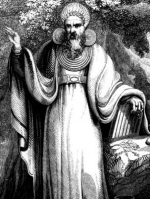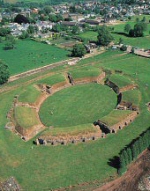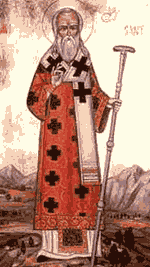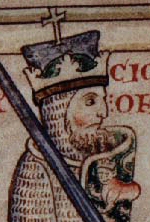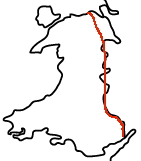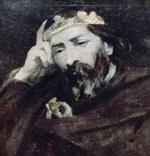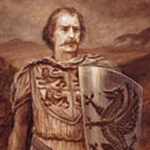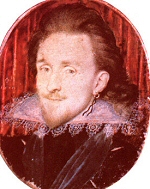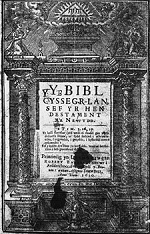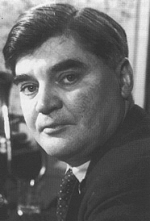I. Celtic Wales 500 BC ®
II. Roman Britain 1st - 4th c.
(Roman fortresses,
roads and mines in
III. Separate Celtic Nation 5th - 13th c.
(
(Edward I conquers NW Wales ® guerrilla warfare – 200 yrs)
V.
Formal
(Act of
VI. Limited Self-Government 1999
(Assembly
of
Celts arrives to Britain![]()
|
Arch-Druid |
§
Mainly farmers,
shepherds, and forest dwellers
§
Religion: Druidism (Druids:
religious and political leaders)
§
Lived in clans
|
|
Roman amphitheatre in Caerleon |
§
Couldn’t conquer most
of § Built forts and stationed large legions there:
§ Connected the forts with stone roads
§
At this time Welsh Celtic clans live in large areas
in |
Celtic
Christian monks arrive to spread the gospel in ![]()
|
St David |
§
St David (the patron
Saint of |
|
king Offa |
§
King Arthur sets up his court an
Caerleon Amphitheatre (Camelot!)
§
516 King Arthur beats the 1st wave of
Anglo-Saxons
§
Border wars between the Welsh and Anglo-Saxons
§
615
§
784 Anglo-Saxon king Offa
has a dyke built as a border: Offa’s Dyke
(almost
= the present boundary between
§
850s Vikings are defeated
|
|
Hywel Dda |
§
§ Welsh laws are collected and written down
§
Welsh
bards played an
important role
|
![]()
|
Gruffudd ap Llewlyn, the last prince of an independent Wales |
§
Establish
Marcher Lordships on the borders + control most
of the lowlands (~Englishires)
§
1140s-1270s: (Norman influence is pushed back)
§
1176 1st
Eisteddfod
held: competition for bards + musicians
(means “chairing” because each
winner received a carved wooden chair)
§
|
End of Welsh Independence
(1284)
![]()
![]()
|
|
§
1730s: Methodism
spreads in
§
18th c: |
|
|
§
1740s: Industrial Revolution in full swing:
§
1790s:
ú Canal + Road building
ú
Miners riot
for higher wages
ú
2nd wave of enclosures
® EMIGRATION to
§
1811
§
1815 Economic depression: many mines close
® lead + iron works
close
® chartist (working class) rallies, riots
d
§
1850 Welsh children schooled in English only
® survival of the Welsh language at stake
§
1848
§
1858
§
1867 The Great Reform Act enfranchised
working class men
|
|
David Lloyd George
Aneurin Bevan |
§
1861 1st National Eisteddfod
held (since 1567)
§
1872 1st university opens (Aberystwyth)
§
1870s: rugby becomes
the national sport
§
1904 Great religious revival
§
1908 David Lloyd George becomes
Chancellor of the
§
1914-8 World War I (Anglo-Welsh identity)
§
1916 Lloyd George becomes the 1st
Welsh Prime Minister
§
1920
§
1925 Playd Cymru (Natioanalist Party of
§
1939-45 World War II
§
1946 National Health
Insurance produced by Aneurin Bevan: a Welsh coalminer who became a trade unionist and a
politician, owing to his talents as a speaker, 1945-51 he was the Health Minister
§
1940s massive immigration
from § 1947 1st Welsh-medium primary school established (Aberystwyth)
1st International Eisteddfod at Llangollen
® it is celebrated every year
since 1947
§
1955 § 1956 1st Welsh-medium secondary school
|
Declining industry leads to mass unemployment
|
|
§
1962 Welsh Language
Society is established: used civil disobedience demanding the legal status of the Welsh language, TV
facilities, road signs in Welsh…
§
1964 Secretary of State for
§
1967 The
Welsh Language Act: recognized the legal
status of the Welsh language
§
1974 13 counties
reorganized into 8 new counties
§
1977 Radio Cymru and Radio
§
1979 Referendum on the creation of a Welsh
assembly: turned down § 1982 S4C: 1st Welsh TV channel established
§ 1984 Margaret Thatcher’s economic restructuring: closed the Welsh coal mines ® the Miners’ Strike, She appointed Englishmen as Welsh Secretaries of State
|
Limited self-government for Wales![]()
|
|
§
1997 Successful Referendum in
§
1999 Establishment of the
Welsh
Assembly in
ú
Devolution: control over domestic Welsh affairs:
economy,
health and education
ú
Laws passed in
ú
The Secretary of
State for
|
